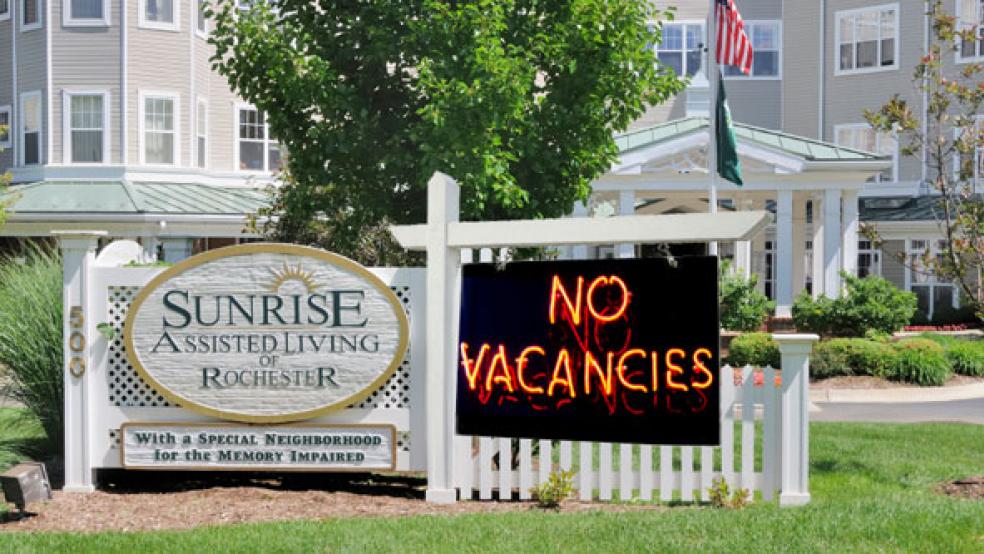You’ve seen the sales pitches about America’s assisted living facilities. Seniors can flourish in bright, cheery alternatives to nursing homes and live out their golden years securely, monitored by medical professionals who tend to their every need.
The business of assisted living paints a depressingly different picture, according to a provocative new documentary from PBS Frontline airing this Tuesday night, accompanied by a series from ProPublica that is being published this week.
Nearly 750,000 American seniors live in assisted living facilities today – but instead of being cared for, many are abused and neglected, according to a year-long investigation.
RELATED: WHY ALZHEIMER'S WILL BE THE FISCAL NIGHTMARE OF THE CENTURY
Some – as shown by the more than 100 lawsuits that Frontline and ProPublica compiled – are dying needless deaths due to policies and mismanagement by some corporations that run them.
“National for-profit chains, concerned about caring for their residents and pleasing their shareholders, have come to dominate the industry,” Frontline and ProPublica learned. But the “standards for care and training, and even definitions for the term ‘assisted living,’ vary from state to state.”
Case in point: “In California, where I live, there are 7,500 assisted living facilities,” A.C. Thompson, the program’s correspondent and co-producer, told The Fiscal Times. “The state regulates these homes, yet on the state’s website there is nothing but a list of facilities. The consumer can’t get detailed reports, data, or any information other than the address of the facilities and the fact that they’re licensed.”
How, then, are those looking for assisted living facilities for elderly parents or other aging relatives able to make informed decisions about selecting a facility? All too often, the Frontline/ProPublica report claims, they’re at the mercy of practiced sales pitches by medical personnel.
“That’s one of the things that surprised me most,” said Thompson. Some companies’ medical personnel are under “very, very intense pressure to move as many people in as possible [to these facilities] and to think of this in sales-oriented terms. Medical personnel are doing sales and marketing and pushing financial goals rather than [practicing] medicine.”
‘WALL STREET LIKES THE CASH FLOW’
The documentary hones in on Seattle-based Emeritus Corporation, described as the country’s largest assisted living operator and one of the largest dementia care providers. Emeritus operates more than 400 facilities. “Wall Street likes its cash flow,” says Frontline/ProPublica. Last year the company took in nearly $1.6 billion in revenue.
For its part, “the company likes the country’s demographic trends,” says Frontline/ProPublica – that is, “elderly Americans in poor health willing to spend tens of thousands of dollars for the chance at safety and care.”
But some state regulators have “cited the company in the deaths of residents. Other officials have regularly found the facilities to be understaffed and employees to be inadequately trained.” The company has settled claims with some families – though few have spoken out against the company, until this documentary.
Frontline/ProPublica interviewed the CEO of Emeritus, Granger Cobb, who on camera refuted claims the company wants to do nothing but keep “the back door closed” – meaning, keep residents in its facilities once they get them in there, until they die, reaping the financial rewards along the way.
“The 75-plus demographic is growing by nearly 400,000 individuals per year,” Cobb told Frontline/ProPublica. “There’s this huge demand that’s already here and on the horizon, and is only going to increase [as baby boomers age]. What we’re looking to do is service that demand as it continues to grow.”
Cobb explained some of the problems in caring for older Americans: “When you’re dealing with … a population that can have unpredictable behavior or is frail, and is kind of a high-risk population to begin with, we will have situations from time to time. But they’re the vast minority. It’s really the exception to the rule.” (Cobb’s 2011 compensation, according to Forbes, was over $4 million.)
The Frontline/ProPublica series points out there are “skilled and dedicated individual caregivers” in the assisted living industry, “professionals absolutely committed to providing our parents and grandparents with the best possible care.” It also says the Emeritus model was worth examining as it was a “perfect study of what’s taking place in a rapidly expanding corner of the country’s health care business.”
Michael Hodin, an expert on aging populations and the executive director of the Global Coalition on Aging (and a Fiscal Times contributor), is not surprised about the crisis of care in assisted living. “This is not news,” he said (he has not seen the Frontline program). “Assisted living – today’s version of long-term care facilities – has a history of bad practices, bad behaviors, corruption and worse, in part because it puts seniors who are in great need, or who may be moving toward being in great need, in very vulnerable situations. So in some ways I’m cynical about any so-called exposes – they’ve been going on for 30, 40 years or longer.”
He also said many assisted living facilities are working hard at providing seniors with a space that feels like home, “providing different stages of care, from not needing much at all, to moving into Alzheimer’s, where obviously a great deal of care is required.”
“There are a lot of good things about assisted living,” says Frontline’s A.C. Thompson. “It provides an alternative to nursing homes that a lot of people can use and in a lot of ways it can create innovation. Our view is not uniformly negative at all.”
Instead, he said, “our point is that the problems in the industry aren’t being dealt with. And the promise of assisted living – that it really can be a great place for a lot of people, who need help, maybe some supervision, help cooking meals, getting around, help managing their medications – we’re at a point where we’re not seeing that promise fulfilled in the way it could be.”






